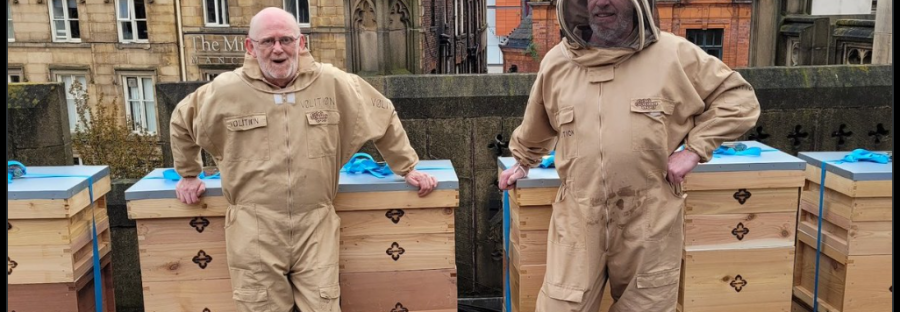A buzz among the city’s summer bustle: a new home for 20,000 bees has been placed on top of one of Manchester’s newest hotels
- Swarms of bees have taken over Manchester city centre
- More than 20,000 of the insets are to take residence on the roof of a new hotel in Deansgate
- The hives installed and maintained by volunteers will produce the city's famous Heavenly Honey
Swarms of bees took over Manchester city centre last weekend and now over 20,000 of them are to take residence on the roof of the Treehouse Hotel in Deansgate.
Yesterday we gave 20,000 heavenly bees a new home on top of one of Manchester’s newest hotels.
Find out more about what our beekeepers and @MCVolunteerTeam got up to here: https://t.co/tCDWWZ5gPB pic.twitter.com/pwoAGmoYa4
— Manchester Cathedral (@ManCathedral) July 22, 2022
The 10 beehives installed by Manchester Cathedral in partnership with Property Alliance group are an extension of the 12 existing hives across the Manchester and Salford Cathedrals.
Beekeepers and volunteers have installed the hives, which will be used to produce the Heavenly Honey sold across the city. The hives are maintained by beekeeper Cath Charnock and the cathedral’s Volition programme, a charity which serves to help people back into regular employment.
Cath said: “We’ve always been really good at what we do with our bees at the cathedral, but working with the Property Alliance Group has been an absolute blessing in that we have been able to invest in our provision for volunteers and really make some longer-term plans.
“Seeing the heavenly bees spread across the city is really exciting and who knows, maybe soon we could start to produce our own heavenly queen bees as well.”
However, just after the unexpected thousands of bees swarmed upon a traffic light on the corner of Cross street and King Street, the beekeepers might have bitten off more than they can chew.
One Twitter user joked: ‘Finally, the Bee Network arrives in central Manchester”
Finally, the Bee Network arrives in central Manchester pic.twitter.com/j3yUvSTwrB
— Dom (@domtee123) July 12, 2022
Late-night partiers and hospitality workers were shocked to see that the bees stuck around to the earlier hours of the morning. Jordan Hardy pictured below captioned his Insta story: “Ey yo, why are they still here.”
The British Beekeepers Association has reassured people that often during the hot days between May and July, honey bees are likely to swam to reproduce as the old queen leaves with some others to form new colonies.



